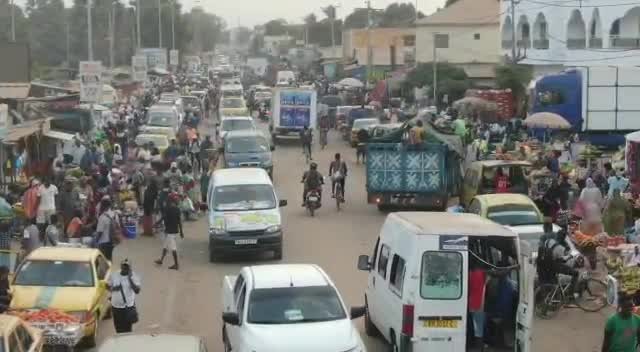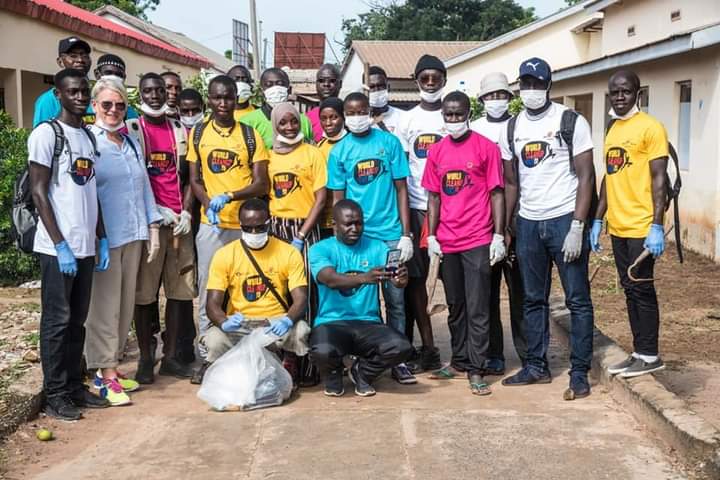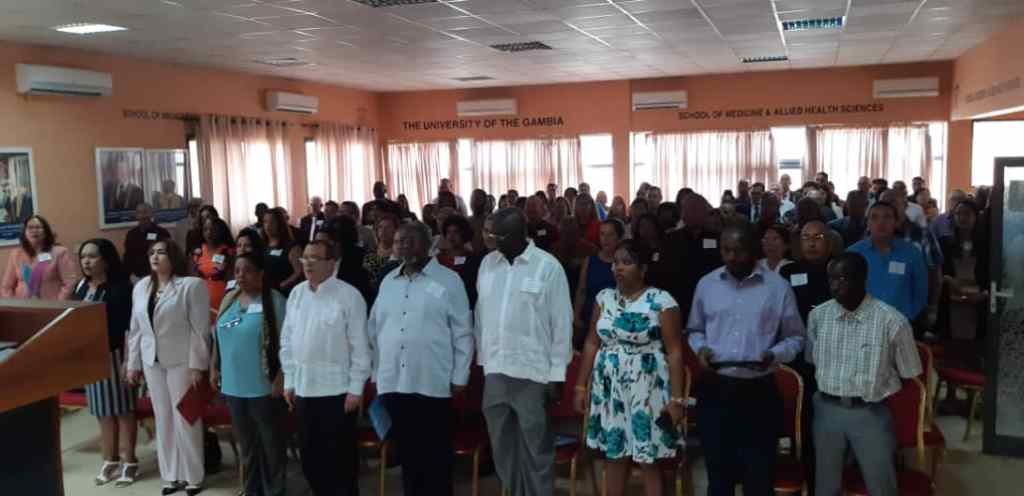By: Nyima Sillah
Buba Saidykhan left The Gambia for Libya in his bid to reach Europe in 2015. The trip which lasted two years was marked by extreme hardship and occasional moments of progress. Like many Gambian youth, he conceived Europe to be the land to make ends meet. However, the experience taught him that this is not always true.
Meanwhile, Buba explained that his decision to leave was driven by desperation. Coming from a low-income background, he carried the weight of family responsibilities and a sick father.
“I was a brilliant science student and even admitted to the Gambia College, but I couldn’t afford the payment. At the same time, I saw my friends doing well in Europe, so I thought it would be the same for me. I went through the desert. A lot of people I started the journey with or met along the way died on this perilous journey.

Photo: Here is Buba Saidykhan in his practical zone. © Nyima Sillah.
“Before the embarkment, I thought getting to Europe through the back way was easy, based on narration from my friends. But the reality on the ground is, absolutely different,” he explained as he recalled his torrid journey that ended in Libya.
Anyhow, “I decided to come back to tell the true story of the ‘back-way’ to save lives and share the skills I learned during my journey with my fellow youth. I want to change their mindset and positively impact their lives,” he shared his sentiment.
Many Gambian migrants who return home after seeking better opportunities abroad are often labeled ‘failures.’ Society tends to view them through a lens of disappointment, assuming their journeys were in vain.
However, the true story of these returnees is one of resilience, transformation, and empowerment. Instead of returning with regret, these migrant returnees are using their experiences to fuel positive change, creating opportunities for themselves and their communities, and Buba is one of them.

Photo: Buba demonstrating one of his decorations. © Nyima Sillah
Since his return, he founded Saidykhan Skills Academy (SADDSA) where he transformed his experience into a platform for empowering young Gambians by providing vocational training in skills such as painting, recycling, decoration, and other related skills.
“I returned because our young people don’t need to leave The Gambia to achieve success. They need the right skills, the right education, and the right opportunities,” said Saidykhan.
“We have the potential; we just lack the resources. I refuse to chase after Europe; I want Europe to recognize my value.”
Saidykhan’s academy now trains dozens of students, many of whom have successfully established their own businesses or made significant contributions across various industries in The Gambia. Through their inspiring stories, migrant returnees like Saidykhan are dismantling stereotypes and misconceptions about returnees, proving that even after facing the most challenging journeys, there is hope, purpose, and a worthwhile future to invest in at home.
Awa Gaye, an Economics student at the University of The Gambia (UTG), is currently participating in a three-month training program at Saidykhan Skills Academy, where she focuses on Decoration and Design as well as the Recycling teams. She emphasizes that youth must take initiative and seize opportunities to realize their dreams.
“In today’s world, skills are our greatest asset—whether in decoration, design, tailoring, or teaching. These are abilities that no one can take from you. Don’t allow your dreams to die out of helplessness. There is hope, and platforms like Saidykhan Skills Academy empower you to rise and shine even brighter,” she asserted.

She called on society to completely rethink its approach to skills development and to stop devaluing vocational or skills-based work.
Nuha Kongira, a returnee from Germany, faced challenges upon his return to The Gambia in 2019 after eight years abroad. Initially stressed and losing clients, he decided to leverage his plumbing skills by earning a certificate from GTTI. With persistence and effective communication, he regained many clients despite the inconsistencies in work.

Photo: Nuha carrying out plumbing work on site. © Nyima Sillah.
Kongira has also trained seven young people in plumbing, four of whom are now successfully working independently. He takes pride in contributing to national development and has shifted his focus from migration to skill expansion and helping others. Despite pressures from friends to consider irregular migration, he emphasizes the importance of building a future at home.
Nuha also shared his frustration on how society views returnees.
“Returnees are stigmatizing; society often exclude us from important things unless we prove ourselves by doing something impactful. It’s tough because when we were abroad, we helped our families, but when we returned, they looked down on us. We’ve been through a lot, and we deserve to be treated with respect.” Nuha narrated.
He is currently encouraging young individuals to reconsider their ambitions, advocating for the importance of not resorting to irregular migration. Instead, he emphasizes the value of honing their skills in their home countries.
According to a migration activist, Ebrima Drammeh, a total of 6149 Gambians returned home in 202, many through assisted repatriation by the international Organization for Migration (IOM).
Society must give returnees a chance
Migrant activist Yaya Sonko highlights the significant potential of migrant returnees to contribute to The Gambia’s economic development due to the skills and experiences they gained abroad. He emphasizes that returnees often possess expertise in fields like construction, agriculture, ICT, and vocational trades, along with a strong work ethic influenced by European standards.

Despite their capabilities, returnees frequently face neglect and a lack of support for retraining and funding opportunities. Additionally, they often encounter stigma in their communities, being wrongfully labeled as failures or criminals after deportation. Sonko urges for public awareness campaigns led by the government and civil society to reshape societal perceptions of returnees, clarifying that many are not criminals but skilled individuals eager to make valuable contributions.
For Gambian economist, Ousman Gagigo, the society and the Government need to support migrant returnees by creating an environment that allows them to rebuild their lives and contribute meaningfully to the economy.

“Society must offer migrant returnees the chance to rebuild their lives and engage in productive livelihoods. The government plays a key role in creating an environment that promotes quality jobs and entrepreneurial opportunities,” Gagigo stated.
According to him, a strategic approach to reintegration would not only enhance the prospects of returnees but also serve as a deterrent to irregular migration among young people seeking better opportunities abroad.
“This approach would not only support the successful reintegration of returnees, but also address the underlying causes of dangerous migration attempts,” he noted.
He warned that without access to capital, training, and infrastructure, returnees may struggle to generate employment or drive innovation in their communities.
A policy on reintegration needed
Hon. Lamin Sanneh, Gambian lawmaker and member of the Foreign Affairs Committee, believes that a comprehensive policy is needed to support migrant returnees in The Gambia.
“The policy we are anticipating should capture the full scope of returnee reintegration. It’s currently at the level of discussion, but we expect it to be brought to Parliament before the end of the year,” he said.

He noted that one of Parliament’s roles is advocacy, while organizations like GIZ and Caritas are already on the ground, working alongside with Parliament to support returnees.
Honourable Sanneh disclosed that some returnees are already making remarkable strides in their communities some are now baker, agriculturist and so on.
“The Ministry of Youth and Sports and the Ministry of Trade should come together to support these returnees,” he urged, and stressed that empowering returnees is crucial for their successful reintegration and contribution to The Gambia’s development.
According to IOM, since 2017, more than 14,000 Gambians have returned to The Gambia through the organization’s Voluntary Humanitarian Return (VHR) and Assisted Voluntary Return and Reintegration (AVRR) programs.
This reportage was produced with the support of the Informal project, funded by the European Union.




